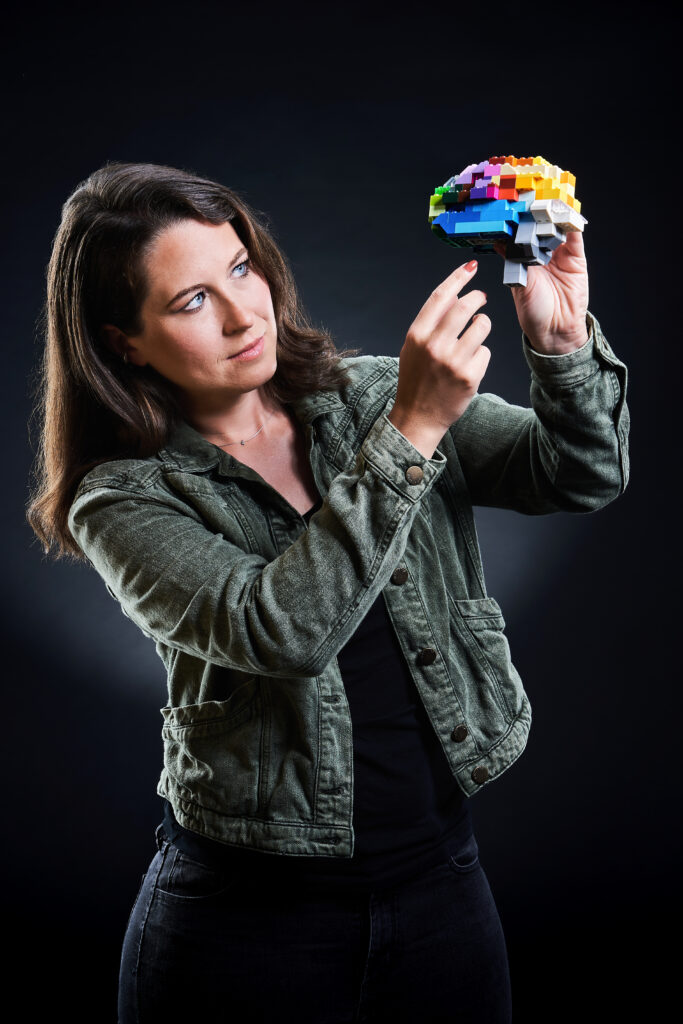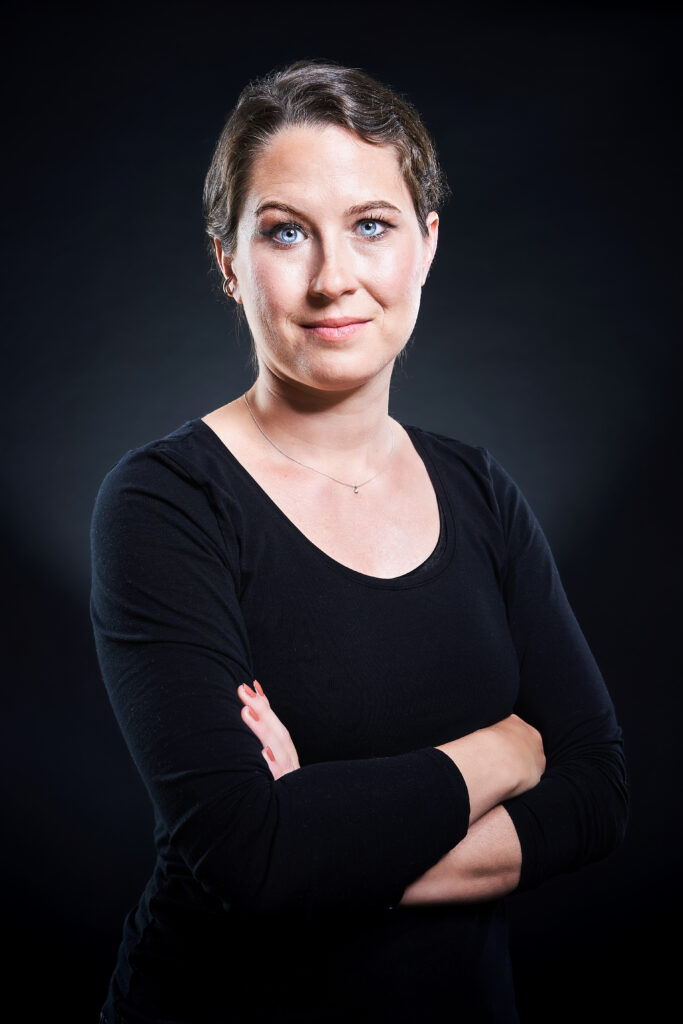„Freud hat es allen verdorben“ – Monika Schönauer im Portrait

In einer Zeit, in der Informationen nur einen Klick entfernt sind und die Aufgabe, sich an Daten und Details zu erinnern, an digitale Geräte delegiert werden kann, wird die Fähigkeit des Gehirns, das Gedächtnis zu steuern, allzu leicht übersehen. Doch für Dr. Monika Schönauer, Juniorprofessorin und Forscherin am Psychologischen Institut der Universität, steht das Gedächtnis im Mittelpunkt ihrer Arbeit und Forschung.
Schönauer, die zu Beginn des Jahres 2020 an die Universität Freiburg kam, leitet ein Team von Forschern, das die Mechanismen der Merkfähigkeit und deren Verarbeitung im Schlaf erforscht.
Ihre Forschung, die sich auf die Bildung stabiler Erinnerungen konzentriert, bietet neue Erkenntnisse darüber, inwiefern Faktoren wie Wiederholungen das Langzeitgedächtnis beeinflussen. „Es hat sich gezeigt, dass es einen aktiven Prozess gibt, der während des Schlafens abläuft und die Erinnerungen, die wir gemacht haben, stärkt. Schlaf unterstützt aktiv die Gedächtnisbildung im Gehirn“, erklärt sie. „Wenn wir schlafen, denken wir, das Gehirn tut nichts, aber es reaktiviert tatsächlich die Gedächtnisspuren, die wir tagsüber gebildet haben. Während des Schlafs probt unser Gehirn, was wir im Wachzustand getan haben, und genau wie wenn wir es im Wachzustand abrufen, hilft es uns, diese Informationen in unserem Langzeitgedächtnis zu speichern und hilft uns, uns länger zu erinnern.“ Der leichte Fluss von Schönauers Erklärungen zeugt von ihrem Fachwissen und ihrer Begeisterung für ihre Forschung.
Forschung ist für Schönauer „etwas, das sehr gut in meine Persönlichkeitsstruktur passt“, da sie sich gerne mit Daten beschäftigt und mit Menschen zusammenarbeitet, die sich ebenfalls für die Forschung begeistern. Sie sieht es als einen Prozess, der sowohl Kreativität als auch Logik miteinander verbindet: „An erster Stelle steht für mich der kreative Prozess, und das macht mir am meisten Spaß. Man kann jede Frage stellen, die einen interessiert und man muss kreativ sein: Kann ich diese Frage mit den mir zur Verfügung stehenden Methoden beantworten? Aber natürlich“, fährt sie fort, „muss man sehr sorgfältig und logisch dabei vorgehen, die Frage zu prüfen und die bestmöglichen Schlussfolgerungen zu ziehen“. Gleichzeitig merkt Schönauer an, dass der Wettbewerb innerhalb der akademischen Welt manchmal Druck ausüben kann und es riskant machen kann, innovative Ideen zu verfolgen, „denn wenn es nicht klappt, könnte es das Ende deiner Karriere oder Anstellung oder sogar das Ende der Karriere der Leute, die mit dir arbeiten oder bei dir ausgebildet werden, bedeuten.“
Das soll nicht heißen, dass es sich nicht lohnt, gewisse Risiken einzugehen. Lange Zeit zögerte Schönauer, sich damit auseinanderzusetzen, wie Träume bei der Gedächtnisreaktivierung eine Rolle spielen, vor allem wegen des Rufs der Träume als Pseudowissenschaft in der Psychologie. „Freud hat es allen verdorben“, sagt sie mit einem Lachen. Doch das anhaltende Interesse ihrer Studierenden an der Untersuchung der Funktion von Träumen „hat irgendwie meine Vorurteile gegen diese Arbeit abgebaut“, sagt sie und lacht, „und ich dachte, weißt du was? Warum nicht?“ Die Studie, die daraufhin durchgeführt wurde, brachte ein lohnendes Ergebnis. „Als wir uns die Daten zum ersten Mal ansahen“, erinnert sie sich, „war es sehr auffällig, dass es tatsächlich wahr war […], dass es Situationen gab, in denen die Menschen von ihren Erlebnissen am Tag träumten.“ „Das ist ein super, super cooles Gefühl“, sagt sie.
Schönauers Leidenschaft für die Forschung ist seit Beginn ihrer akademischen Laufbahn präsent. Obwohl sie sich zunächst für Kommunikationswissenschaften eingeschrieben hatte, um Journalistin zu werden, wechselte Schönauer bald zu Psychologie, weil sie Kurse wie biologische Psychologie und kognitive Neurowissenschaften interessanter fand. Es dauerte nicht lange und sie fand eine Stelle als wissenschaftliche Mitarbeiterin im Studiengang Neurowissenschaften an der LMU München, und „so bin ich in mein Forschungsgebiet gestolpert“, sagt sie und grinst. „Ich weiß noch, dass mein erster Tag mein Geburtstag war. Ich habe mich riesig darüber gefreut; es war perfekt.“ Von da an promovierte Schönauer an der LMU und trat anschließend Postdoc-Stellen in Tübingen und an der Princeton University in den Vereinigten Staaten an.
Schönauer schreibt ihrer Zeit in den USA eine wesentliche Rolle bei der Stärkung ihres Bewusstseins für die Gleichstellung der Geschlechter im wissenschaftlichen und akademischen Kontext zu. „Je methodenlastiger man wird, desto ‚bro-hafter‘ ist es auch“, bemerkt sie. Dies kann dazu führen, dass implizite Vorurteile stärker hervortreten und Frauen im Vergleich zu ihren männlichen Kollegen vor zusätzliche Herausforderungen gestellt werden. In Bezug auf ihre eigenen Erfahrungen stellt Schönauer fest, dass die Wahrscheinlichkeit, dass sie auffällig kritische oder zweifelhafte Bemerkungen zu hören bekommt, wenn sie Vorschläge macht oder Berechnungsmethoden vorstellt, deutlich höher ist. „Ich hatte immer den Eindruck, dass ich als Frau in Deutschland erst einmal beweisen muss, dass ich das kann, was ich tue, wenn ich in diesem Bereich arbeite“. Im Gegensatz dazu empfand sie den Diskurs über geschlechtsspezifische Vorurteile in den USA als robuster, und ihre Zeit in Princeton hat ihr gezeigt „wie es sich anfühlt, wenn Leute einen von Anfang an ernst nehmen.“

„Es ist interessant, wie sich der eigene Blickwinkel verschieben kann, wenn man eine andere Kultur erlebt“, sinniert sie. Schönauers Erziehung durch eine unabhängige Mutter förderte in ihr den starken Glauben an ihre Fähigkeit, alles erreichen zu können was sie nur wolle. Sie sagt ganz nüchtern: „Ich habe immer gelernt, dass sich die Jungs etwas von dir abgucken sollen.“ Dennoch können unbewusste Vorurteile können es schwierig machen, Frauen an die Spitze zu bringen. „Bevor ich in die USA zog, hatte ich die Idee, dass wir eine Fotowand mit unseren wissenschaftlichen Vorbildern zu machen. Und dann haben wir festgestellt, dass es nur Männer sind. Und wir dachten: Wie ist das möglich? Wer sind die Frauen?“ Sie weist darauf hin, dass, „wenn unser ganzes Feld sich so verhält, dass nur Männer die Hauptredner sind und immer in den Büchern erwähnt werden, dann ändern sich die Dinge nicht.“ Wenn es also darum geht, Veränderungen zu fördern, zeigt sich Schönauer proaktiv und geht mit gutem Beispiel voran: „Wenn ich meine Vorlesungen halte, vermerke ich jetzt, wenn die Arbeit von einer Forscherin stammt“, sagt sie. „Ich versuche, die Voreingenommenheit umzukehren“. In einem Bereich, in dem Bachelor- und Masterstudiengänge größtenteils aus weiblichen Studierenden bestehen, kann die alltägliche Repräsentation eine große Wirkung haben. „Wenn ein Studiengang zu 90% aus Frauen besteht, aber alle Professoren männlich sind, was sagt einem das dann über den Berufswunsch zur Professur?“, fragt Schönauer. Sie betont weiter: „Ich glaube, es wäre schwieriger für einen, sich als Forscherin, Lehrerin oder der Wissenschaftlerin zu sehen.“
Schönauer glaubt, dass die Normalisierung und das bewusste Eintreten für Frauen* in der Wissenschaft zu einem integrativeren und gerechteren Umfeld in der Wissenschaft beitragen können. Schließlich wird unser Verständnis der Welt durch unsere Erfahrungen und Interaktionen geprägt, und „wie unser Gehirn die Welt wirklich erlebt und sein Wissen abspeichert“, sagt Schönauer, „ist der Wissenschaft als System sehr ähnlich.“
Portrait von Florence Tang
Florence Tang hat kürzlich ihr Studium an der Universität Freiburg abgeschlossen, Geboren und aufgewachsen in Los Angeles, war Florence schon immer fasziniert von dem, was Menschen und Nationen zusammenbringt. Sie kam nach Freiburg, um eine internationale Perspektive zu gewinnen, und studierte dort Governance mit dem Schwerpunkt Internationale Beziehungen am University College Freiburg. Während ihrer Zeit am UCF leistete sie einen aktiven Beitrag zur Studentengemeinschaft, indem sie das Social-Media-Team des UCF gründete und als Mitglied des Studierendenrats sowie als Leiterin des Bereichs Outreach fungierte. Als Fulbright-Finalistin wird Florence das Jahr 2023-24 in Taiwan verbringen, um Englisch zu unterrichten und sinnvolle interkulturelle Verbindungen zwischen den Vereinigten Staaten und Taiwan zu fördern. Sie hofft, eine diplomatische Laufbahn als Beamtin im Auswärtigen Dienst des US-Außenministeriums einzuschlagen. Dieser Wunsch wurde maßgeblich von den Frauen beeinflusst und unterstützt, mit denen sie während ihrer Praktika in der US-Botschaft in Berlin und Wien und ihrer gesamten Studienzeit zusammenarbeiten durfte.